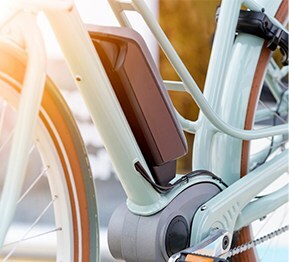
Health Canada releases advisory regarding misuse or modifications around lithium-ion batteries
by CM Staff

The lithium-ion batteries found in e-mobility devices are larger and more powerful than those found in smaller products, and incidents involving these batteries can be more severe resulting in "thermal runaway."

Image of lithium-ion battery bicycle close-up (CNW Group/Health Canada)
OTTAWA — Health Canada reports that there has been a reported increase in e-mobility device battery fires across North America over the last few years.
In the United States, between January 1, 2021, and November 28, 2022, the Consumer Products Safety Commission (CPSC) received reports from 39 different states of at least 208 e-mobility fire or overheating incidents. These incidents resulted in at least 19 fatalities involving electronic scooters and bikes, and hoverboards.
Health Canada is warning people in Canada about the misuse or modification of lithium-ion batteries used in e-mobility devices. Lithium-ion batteries are found in e-mobility devices such as electronic bicycles and scooters, and also in a variety of products such as power tools, toys, personal electronics, vaping products and power banks. Lithium-ion batteries are more easily damaged than other types of batteries and can become hazardous in certain conditions as they are more unstable than other types of batteries.
The lithium-ion batteries found in e-mobility devices are larger and more powerful than those found in smaller products, and incidents involving these batteries can be more severe resulting in “thermal runaway.” Thermal runaway can occur when too much heat builds up inside the battery due to damage, malfunction or misuse. This excessive heat, in combination with the highly flammable contents of the lithium-ion battery, can lead to explosions or fires that are extremely difficult to extinguish.
It is important to charge and store your lithium-ion batteries safely (following the guidance below) and to only replace them with parts from the original manufacturer. If the original manufacturer cannot be reached, contact the product retailer. After-market batteries purchased separately or from an unknown source can be a risk as they may not follow the appropriate safety standards and may not be compatible with your e-bike or e-scooter. It is also important to never modify, tamper with or attempt to make your own lithium-ion battery. This could result in the battery being damaged or compromised internally, potentially leading to short circuits, overheating, fires or explosions, and could result in severe injuries and even death.
What you should do:
- If you currently own an e-mobility device, never attempt to modify, tamper with or build your own lithium-ion batteries.
- Always use the original lithium-ion batteries that came with your e-bike or e-scooter.
- Only replace batteries with original parts from the manufacturer.
- Check to see if your e-mobility device is compliant with the:
- ANSI/CAN/UL 2272 — Standard for Electrical Systems for Personal E-Mobility Device; and,
- ANSI/CAN/UL 2849 – Standard for Safety for Electrical Systems for eBikes.
- Stop charging your lithium-ion batteries once they are fully charged.
- Charge and store lithium-ion batteries away from items and surfaces that can catch fire, such as pillows, beds and couches.
- Contact your municipality for instructions on how to safely dispose of lithium-ion batteries. Batteries are considered hazardous waste and should not be placed in household garbage.
- If an incident occurs with an after-market lithium-ion battery you’re using, report it to Health Canada.
Health Canada says they are working with Transport Canada on this issue. Transport Canada regulates some e-mobility devices, while Health Canada regulates some lithium-ion batteries depending on the products they’re used in.
Health Canada says they regularly monitors consumer products on the Canadian market and will continue to investigate reports related to after-market lithium-ion batteries to help keep consumers safe.